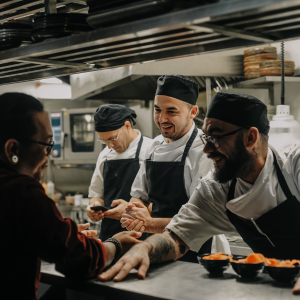Becoming a chef is a culinary journey that involves mastering not only the art of cooking but also the intricacies of restaurant management. If you aspire to become a chef with a keen eye on managing your own restaurant someday, this comprehensive guide will walk you through the steps.
Culinary Education And Skill Development
To lay the foundation for a successful career in restaurant management as a chef, you must begin with a strong culinary education. Enroll in a reputable culinary school where you can learn essential cooking techniques, culinary theory, and kitchen management skills. Building a solid culinary skill set is the first stepping stone toward effective restaurant management.
Culinary schools offer a structured curriculum that covers a wide range of culinary topics, from basic knife skills to advanced cooking techniques. You'll also gain knowledge in food safety and sanitation, menu planning, and flavor profiles. While in culinary school, take every opportunity to practice and perfect your culinary skills. Participate in cooking competitions, collaborate with classmates on projects, and seek guidance from experienced instructors.
Moreover, it's crucial to gain hands-on experience during your culinary education. Many culinary schools provide students with the opportunity to intern or work in professional kitchens. These experiences will not only enhance your cooking skills but also give you a glimpse into the fast-paced and demanding environment of a restaurant kitchen.
Gain Practical Experience

Hands-on experience is invaluable for aspiring chefs looking to manage restaurants. Start by working in various kitchen positions to gain insights into the daily operations of a restaurant. From line cook to sous chef, each role teaches you different aspects of kitchen management, teamwork, and customer service, which are crucial for restaurant success.
Begin your culinary career as a line cook, where you'll learn the fundamentals of cooking and kitchen organization. Pay attention to the rhythm of the kitchen, develop speed and efficiency, and practice working under pressure. As you gain experience, you can progress to more advanced roles, such as a sous chef or a station chef, where you'll take on additional responsibilities and leadership roles in the kitchen.
During your time in the kitchen, focus on developing your palate and understanding the nuances of different ingredients. Experiment with flavors, textures, and techniques to create your signature dishes. Seek feedback from experienced chefs and be open to continuous improvement.
Understanding Restaurant Operations
To excel in restaurant management, it's essential to understand the inner workings of a restaurant beyond the kitchen. Familiarize yourself with front-of-house operations, such as dining room management, customer service, and staff supervision. This holistic perspective will help you oversee all aspects of your future restaurant effectively.
Take the opportunity to work closely with the front-of-house staff while gaining experience in various kitchen roles. Understanding the dynamics of the dining room, including customer interactions, table turnover, and seating arrangements, is crucial for creating a seamless dining experience.
Additionally, learn about restaurant logistics, such as inventory management, ordering supplies, and controlling food costs. These skills are essential for running a financially successful restaurant. A well-managed kitchen not only produces exceptional food but also operates efficiently to maximize profits.
Specialize In Your Culinary Niche

Identify a culinary niche or specialization that sets your restaurant apart. Whether it's a focus on Italian cuisine, farm-to-table dining, or fusion flavors, honing your expertise in a specific area will draw in a dedicated customer base and create a unique selling point for your restaurant.
Specialization allows you to stand out in a competitive culinary landscape. Consider your personal interests and strengths, as well as the culinary trends in your region, when choosing your niche. For example, if you have a passion for seafood, you might specialize in seafood dishes sourced from local fisheries.
Once you've chosen your culinary niche, continue to refine your skills and knowledge in that area. Attend workshops, seminars, and culinary events related to your specialization. Experiment with innovative recipes and techniques to create a menu that reflects your unique culinary style.
Financial Management And Business Acumen
Restaurant management involves more than just creating delectable dishes. It requires financial acumen to budget effectively, manage expenses, and ensure profitability. Consider taking courses or seeking mentorship in business and finance to prepare yourself for this critical aspect of restaurant ownership.
Understanding restaurant finances is essential for making informed decisions that impact your restaurant's success. Familiarize yourself with financial statements, such as profit and loss statements, balance sheets, and cash flow statements. Learn how to analyze these documents to assess the financial health of your restaurant.
Budgeting is a crucial skill for restaurant managers. Create a detailed budget that encompasses all expenses, including food costs, labor, rent, utilities, and marketing. Regularly review and adjust your budget to ensure that your restaurant remains financially sustainable.
Moreover, develop pricing strategies that consider the cost of ingredients, overhead expenses, and market demand. Pricing your menu items appropriately ensures that you can cover your costs while offering competitive prices to attract customers.
Build A Strong Team

A successful restaurant relies on a skilled and dedicated team. Learn how to recruit, train, and motivate staff members to maintain the high standards you envision for your establishment. Effective leadership and teamwork are pivotal in the world of restaurant management.
Start by hiring employees who share your passion for food and commitment to excellence. Look for individuals who not only possess the necessary skills but also fit well within your restaurant's culture. Conduct thorough interviews and reference checks to ensure that your team members align with your vision.
Once you've assembled your team, invest in training and development programs to enhance their skills and knowledge. Provide ongoing feedback and opportunities for growth to foster a positive work environment and employee loyalty.
Motivate your team by setting clear expectations, recognizing their achievements, and leading by example. A cohesive and motivated team contributes to a positive dining experience for your customers and ultimately drives the success of your restaurant.
Marketing And Branding
Promoting your restaurant is key to attracting and retaining customers. Develop marketing strategies, create a strong brand identity, and utilize digital platforms to reach a wider audience. Effective marketing can significantly impact the success of your restaurant.
Start by defining your restaurant's unique selling proposition (USP) and brand identity. What sets your restaurant apart from others? Is it your signature dishes, ambiance, or commitment to sustainability? Use your USP to create a compelling brand story that resonates with your target audience.
Establish a strong online presence by creating a user-friendly website that showcases your menu, photos of your dishes, and customer reviews. Utilize social media platforms to engage with your audience, share behind-the-scenes glimpses of your kitchen, and promote special events and promotions.
Consider partnering with local food influencers or bloggers to increase your restaurant's visibility. Hosting special events, such as chef's table dinners or themed nights, can generate excitement and attract new customers.
Additionally, invest in online advertising, such as pay-per-click (PPC) campaigns or social media advertising, to reach a broader audience. Monitor the performance of your marketing efforts and adjust your strategies based on the results to maximize your return on investment.
From Chef To Entrepreneur
In the quest to become a chef and eventually manage your own restaurant, a strategic blend of culinary education, hands-on experience, and a holistic understanding of restaurant operations is paramount. Commence your journey with a robust culinary education, honing essential skills in cooking techniques, kitchen management, and flavor profiles. Hands-on experience, from line cook to sous chef, provides invaluable insights into kitchen dynamics, teamwork, and customer service, building a foundation for effective restaurant management.
Beyond the kitchen, delve into front-of-house operations, understand the intricacies of inventory management, and cultivate financial acumen. Specializing in a culinary niche creates a unique identity while mastering budgeting, pricing strategies, and financial statements is crucial for long-term success. Building a cohesive and motivated team further enhances your restaurant's prospects, and effective marketing and branding strategies are key to attracting and retaining a loyal customer base. As you embark on this culinary adventure, remember that each step contributes to your expertise as a chef and the success of your future culinary establishment.






